Carriers for Hiking with Infants and Small Kids
Hiking with your kids is, in a word, awesome. When your little ones are too little to make it on their own (especially if they are babies!), a hiking carrier is just what you need.
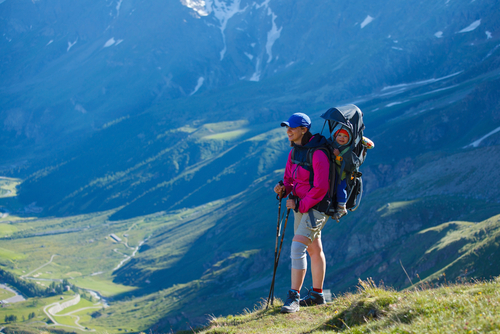
Going out into nature with your little ones lets you see familiar places through new eyes — because everything is so new to them.
Those of you who love hiking already understand what research shows: getting out into nature is tremendously good for the mind and the body (and as a bonus, getting outside and exercising can help new mothers battling dramatic hormonal changes). Exposure to nature has wonderful benefits for babies and kids, as well (language development? Sleeping benefits? Yes, please).

The general rule of thumb is that you can use baby hiking carriers once your baby hits six months and has excellent head and neck control; most carriers will last you well into the toddler years (heck, we still schlep our 3.5-year-old around in our carrier when he gets tired on a hike).
Soft structured baby carriers — these are your garden variety baby carriers, like the Ergo — can get you through the first six to ten months or so of hiking, but as your baby gets bigger, you may want something with more structure and/or storage options. Here’s why:
- Baby hiking carriers, like regular hiking backpacks, use lightweight aluminum frames to provide the structure you need to carry heavier cargo (aka your kid plus his snacks, water, diapers, and so on).
- Baby hiking carriers also keep you and your kiddo cool as you sweat up those hills, since he isn’t smushed right up against your body (like in a soft carrier).
- Backpack-style baby hiking carriers also give little passengers a better view of their natural surroundings from a higher vantage point on your back (“I’m as tall as Mom and Dad—wheee!”).
Baby hiking carriers can feel a bit top-heavy when you first put them on, but you’ll get used to that feeling in time. Just proceed with caution when starting out, and be sure to have someone spot you at first — you don’t want to risk dropping it (or having it tip sideways) with your child inside.
REI has some great advice on how to safely fit, load, carry, and unload your child in a hiking carrier here. Definitely read this before using one if it’s your first time.
Best Baby Hiking Carriers
Generally, well-constructed baby hiking carriers with handy extras will run you upwards of $200, though some budget-friendly options can work well for shorter, occasional hikes. If you’re pregnant and know that hiking with your baby is definitely in your future, one of these might be a great addition to your baby registry. #thinkingahead
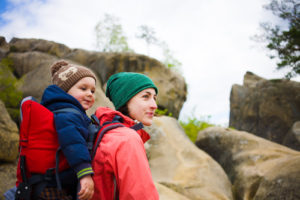
*Note: while most reviewers tout the comfort of the following baby hiking carriers, not every carrier will work well for every body type.
Since comfort is the name of the game when hiking with heavier kids on your back, it’s best if you can try out a few different carriers until you find one that works for you (and your partner, if he/she is also going to be using it). For example, the Osprey was uncomfortable for me (though others swear by how great it feels), whereas the Deuter felt great on my back… it was just a better fit for my torso.
With that in mind, let’s move on to the carriers (in order of price, from lowest to highest). *Keep in mind you might also have luck finding used hiking carriers in your local second hand stores.
ClevrPlus Cross Country Carrier ~$104 — ECONOMY PICK
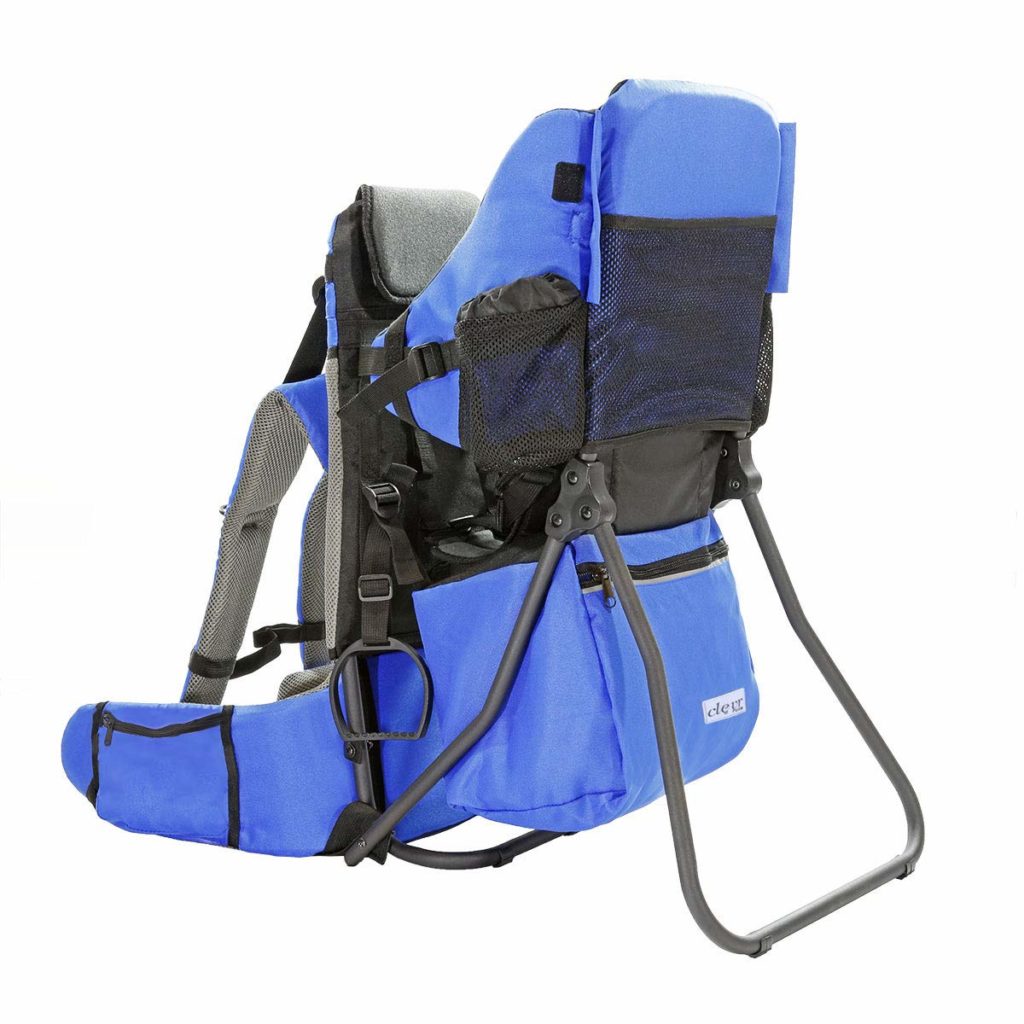
Pros: The ClevrPlus Cross Country Carrier is one of the most highly-rated baby hiking carriers for a very reasonable price. It weighs only 5.5 pounds, carries up to 33 pounds (roughly a 3-year-old), and has a retractable sun and rain canopy. It also has pockets for your stuff, including two water bottles, plus a stable kickstand, foot stirrups for your kiddo (so she has a place to put her feet… and not kick you… ahem), and padded straps and a hip belt. That’s a lot of extras for an economy hiking carrier!
Cons: This carrier is not that comfortable on longer hikes. The padding on the hip-belt and shoulder straps are lower quality than those on higher-end hiking carriers (you get what you pay for…). Also, some find it difficult to adjust the shoulder straps on the Clevr.
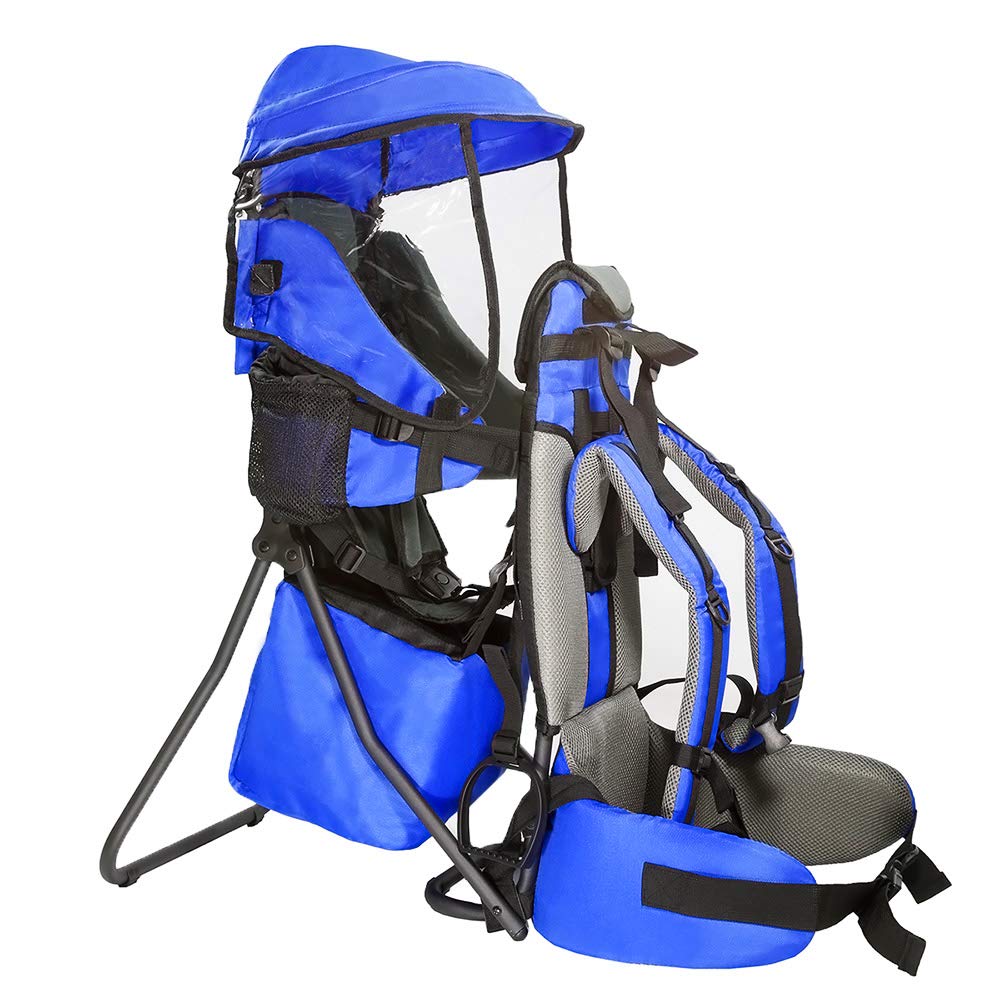
Still, if you’re an occasional hiker and/or on a budget, this hiking carrier comes with decent perks, especially for the price. But if you’re a more serious hiker who enjoys frequent and longer hikes, this carrier may not measure up.
A perk for your kiddo: Clevr positions your child higher up, so he’ll get a great view of the surroundings — but beware of low tree branches!

Kelty Journey PerfectFit ~$269
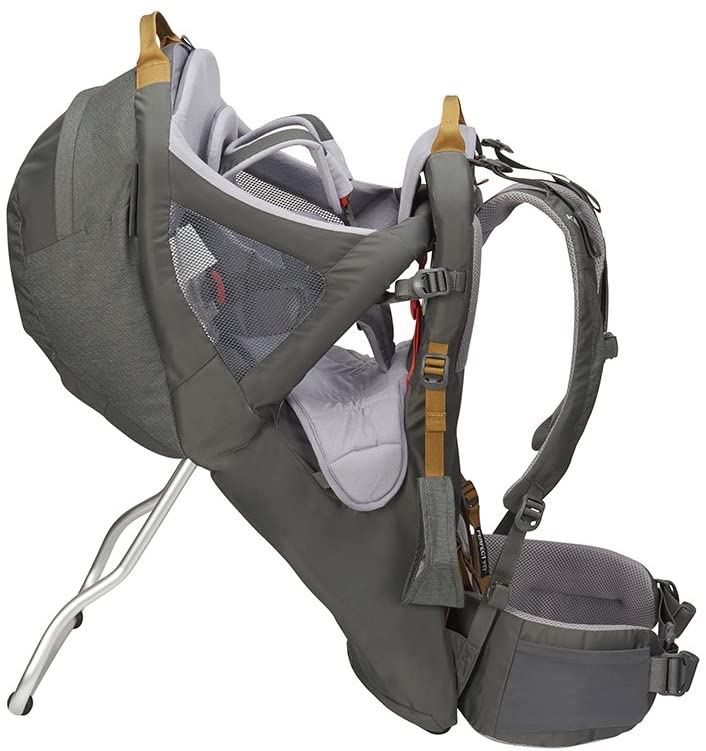
Kelty’s 6.6 lb Journey PerfectFit holds kids and gear up to 48.5 lbs. It comes with adjustable foot stirrups, a wide seat, a washable drool pad, 5 point safety harness, and three exterior storage pockets. Kelty’s carriers have long been reviewed as some of the most comfortable on the market, and they fit a wide range of torso lengths.
Cons: This carrier doesn’t come with a sunshade (though you can buy one separately) and it does not have a side entry option for bigger kids. However, the Journey PerfectFit Signature ($369) and PerfectFit Elite ($386) both include integrated sunshades (plus a lot more storage: 6 exterior pockets on the Signature and 9 on the Elite, which also has a hydration sleeve).
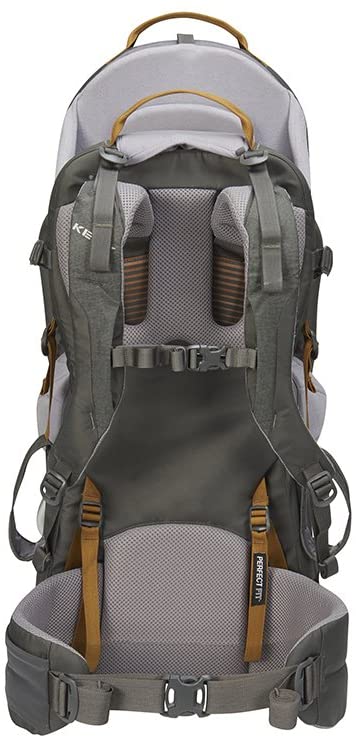

Deuter Kid Comfort ~$269 — EDITOR’S CHOICE
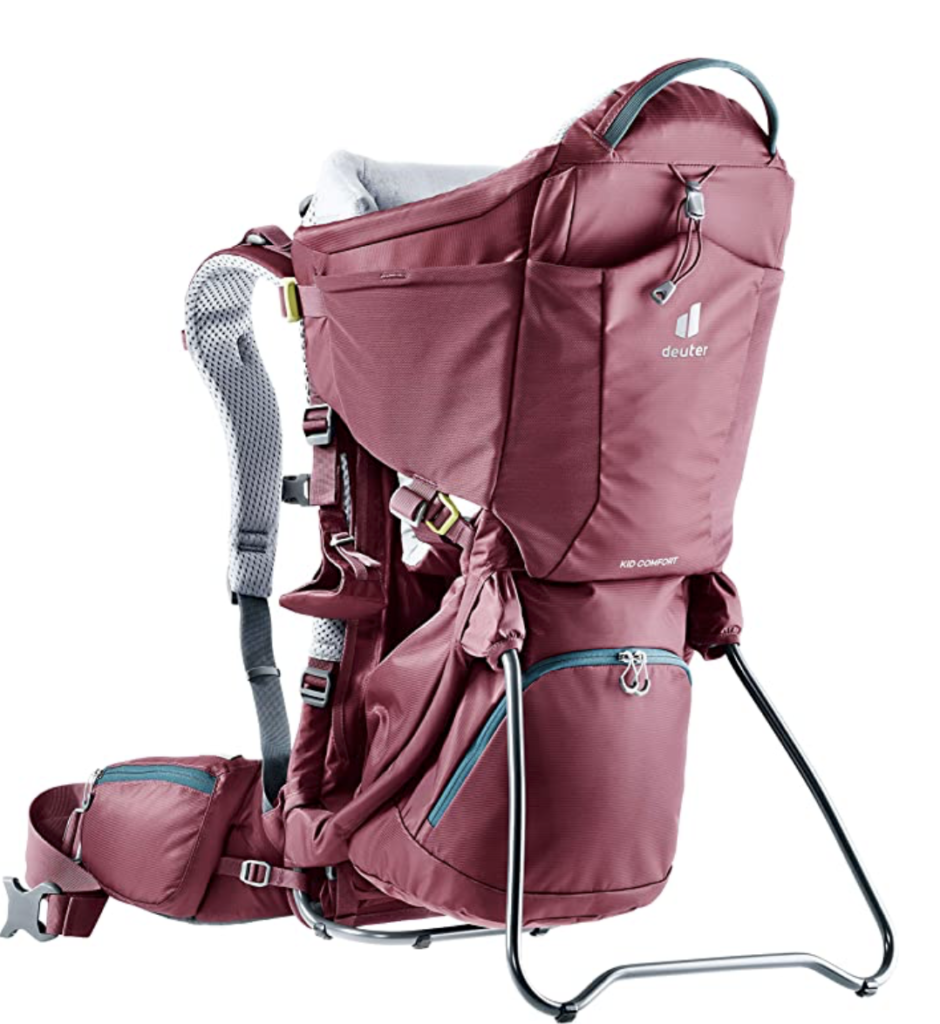
Pros: The 7.5 pound Deuter Kid Comfort wins our baby hiking carriers top pick because it has everything you could want in a carrier: an integrated sunshade, an awesome pillow for napping/drooling, well-ventilated fabric, an ergonomic child seat, step-in side access (yes!), foot stirrups, and easy adaptability to different parent heights. It has a maximum load capacity (kid+gear) of 48 pounds.
Deuter claims that its enlarged mesh material creates airflow that keeps you 25% less sweaty than other backpacks (who knows how they measure that, but they seem very proud).
Personally, my husband (6’1”) and I (5’8”) both found this carrier to be very comfortable.
Cons: There are very few complaints about this carrier… It does take some effort to open/close the kickstand (it doesn’t automatically open when putting the carrier down), so beware of pinching your fingers.
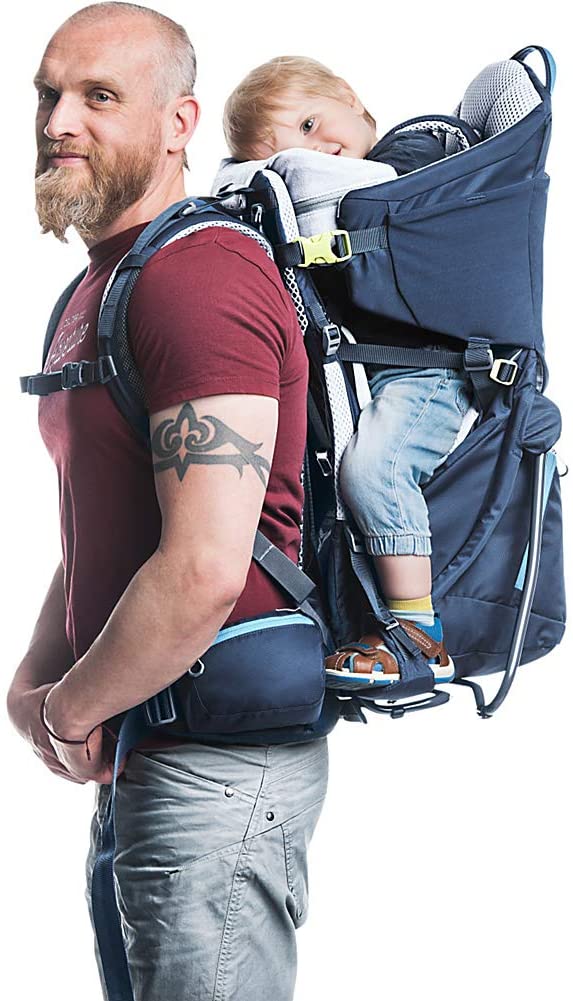

Osprey Poco Plus ~$320
The Poco Plus is an ~8 pound hiking carrier good for up to 48.5 pounds of kid + gear.
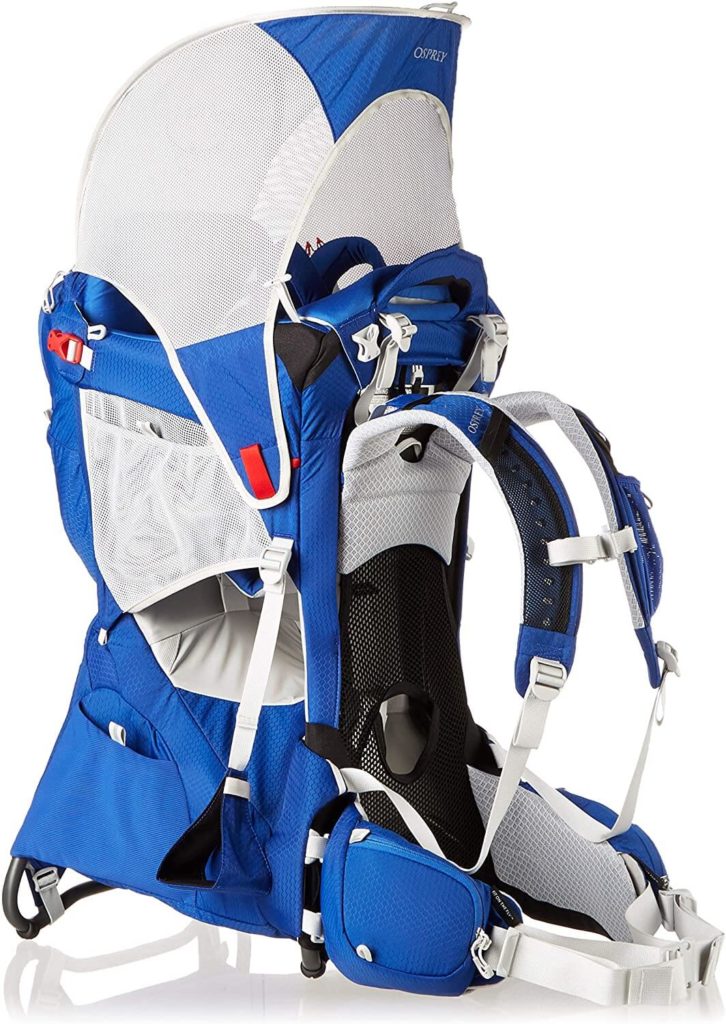
Pros: Osprey has taken its innovative “Anti-Gravity Suspension System” from its backpack line and applied it to its baby hiking carriers. This essentially means that the weight of the carrier is distributed in a way that is much better and more comfortable for your body — it pulls the weight off your back and shoulders and allows your much stronger hips to do the heavy lifting. Hiker parents really seem to notice and appreciate this feature.
It comes equipped with almost every feature you could imagine: sunshade, hydration pocket, phone pocket, generous storage space, easily adjustable torso to fit different-sized wearers, mesh back panel for ventilation, and toy attachment loops for baby entertainment.
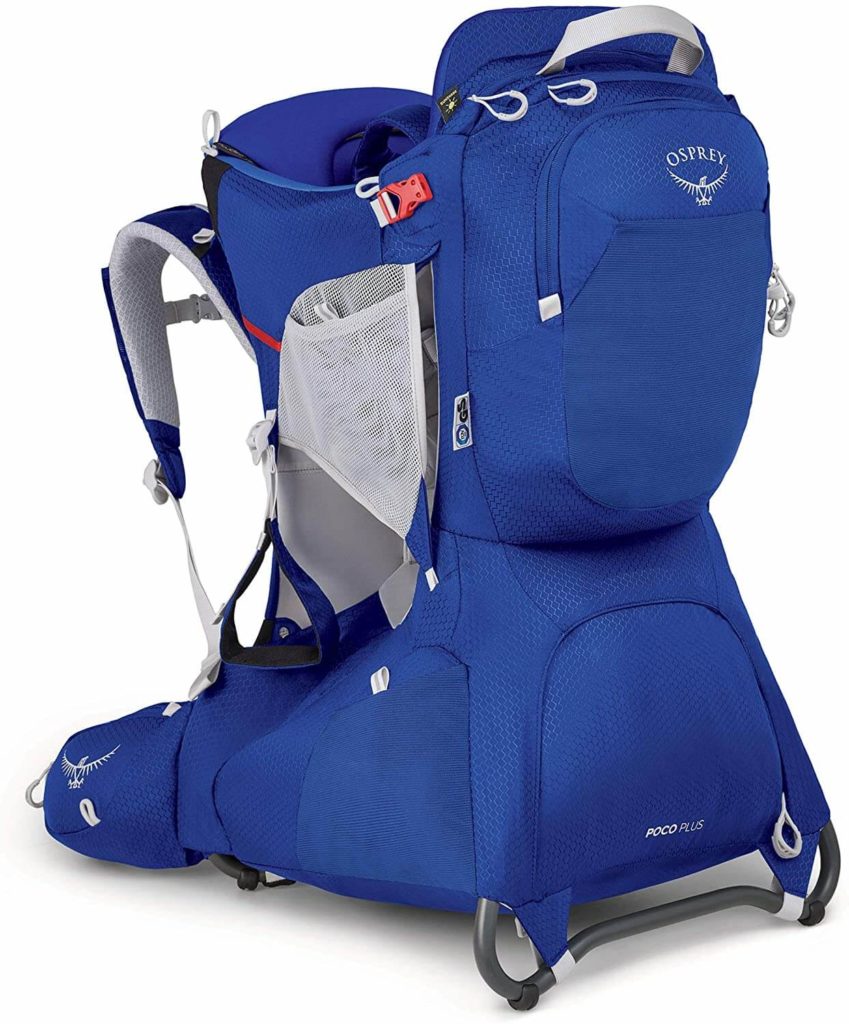
In addition, the Osprey has stirrups (yay for not getting kicked!), is made of high-quality materials, and will last longer than you actually want to carry your kids around for (which means you may be able to resell it later on). It also has an easy-to-locate harness system, in which the buckle is placed higher up (near your child’s chest), so you don’t have to fish around to find the harness like you do with most other carriers.
Cons: The Osprey has no side entry option, and the drool pad really isn’t big enough for your kiddo to use comfortably as a pillow. Also, a few reviewers say the Osprey carrier digs into their hips, though many others rave about its extreme comfort. (Remember that one size just doesn’t fit all with hiking carriers, so definitely try it — and others — on before making a final purchase/decision, if you can.)
It’s also important to note that, like the Thule, this carrier is pretty big! In addition, its kickstand takes some effort to pop open or closed — it does not automatically open when you set it down.
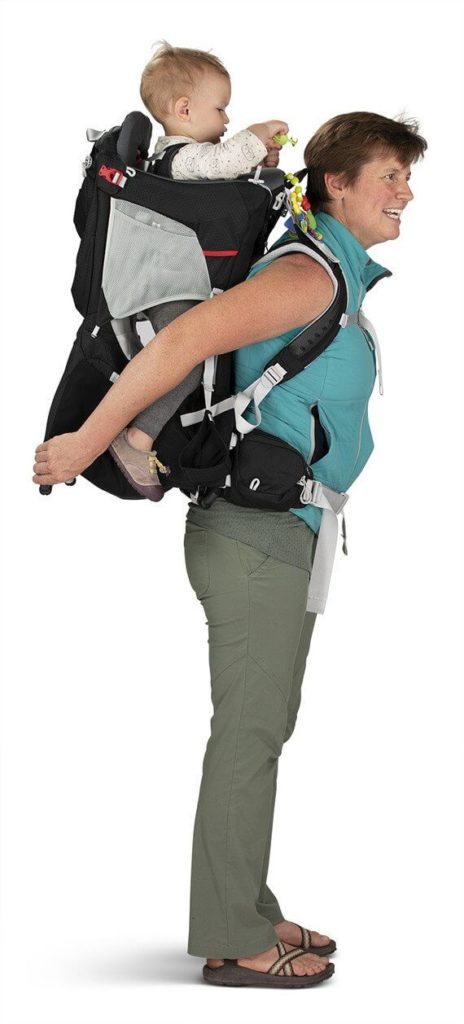

Thule Sapling ~$379
The Thule Sapling recently got a major makeover — it weighs in at 7 pounds (a full pound less than the previous iteration) and can carry a max of 48 pounds (kid plus gear). The Sapling carrier has tons of features parents will appreciate: a UPF 50 sunshade and an easily adjustable back panel and hip belt, a 5-point harness, a ventilated back for plenty of airflow, zippered hip pockets for easy access to snacks and other important essentials (and actually, the “real” storage basket (below, right) is arranged such that you could reach that while on the go, too), and a side door for your older kids to step in/out themselves.
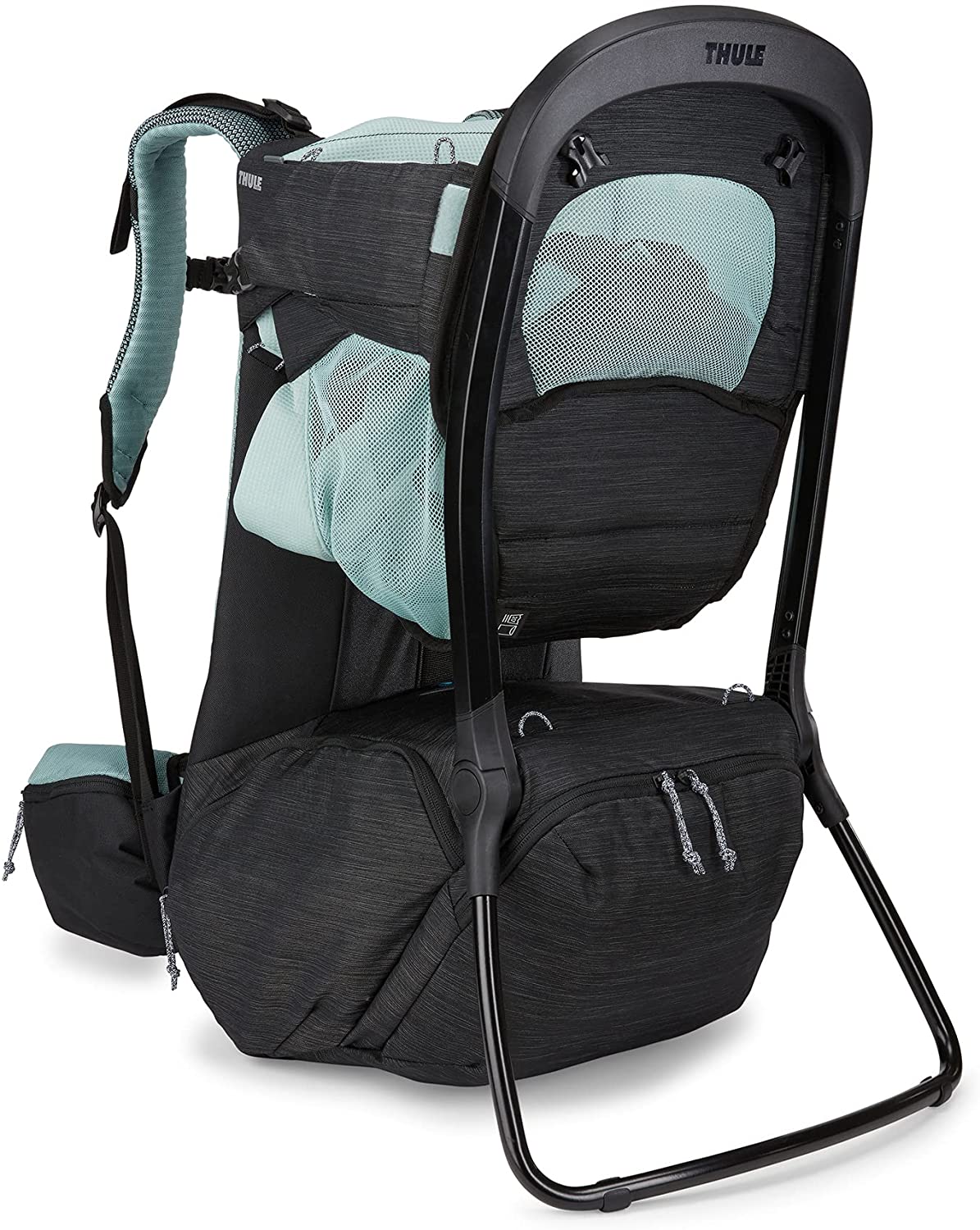
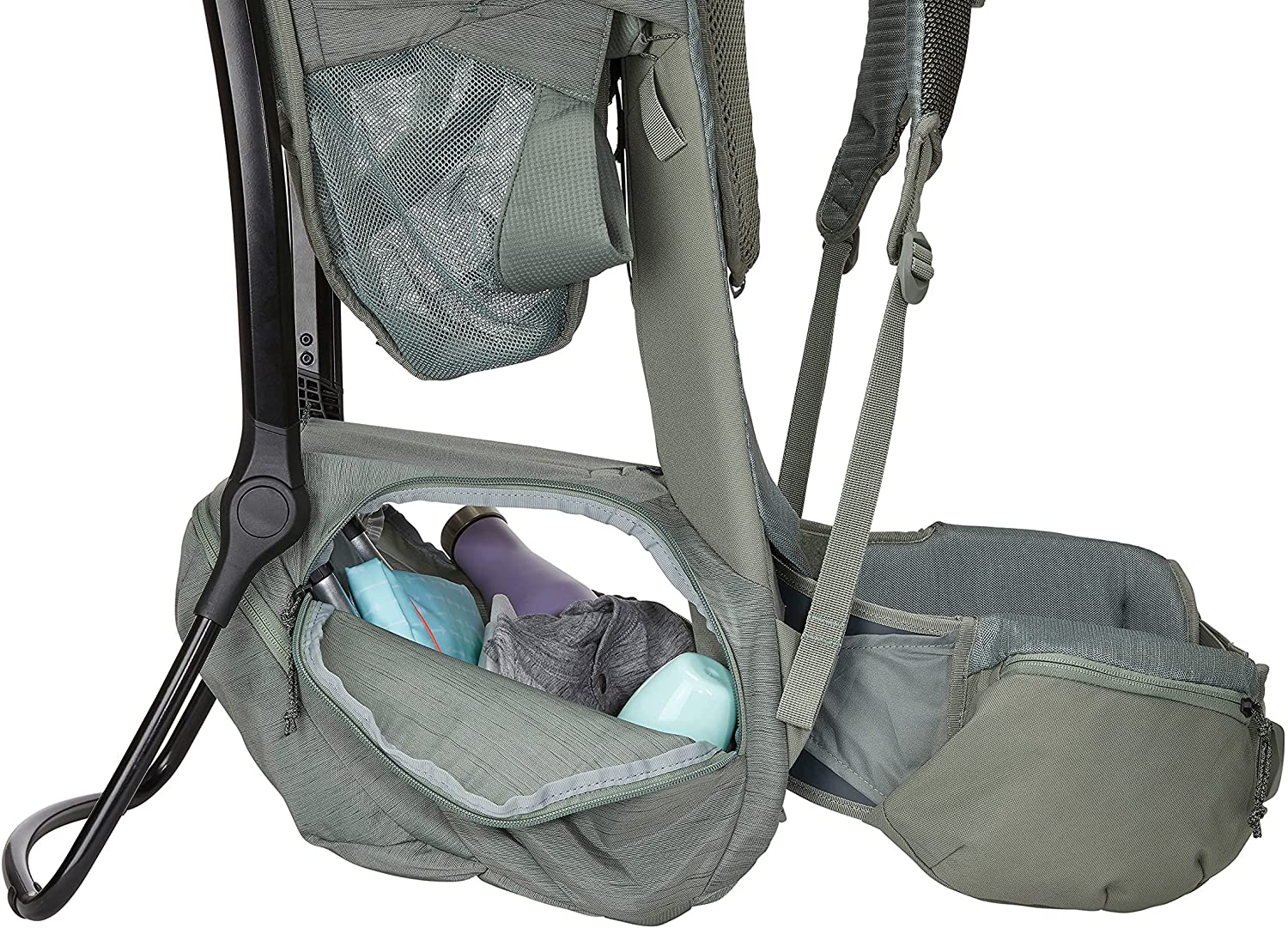
Note that though there is a storage compartment for a hydration bladder, there is no actual water bottle pouch on this new version, which is a major bummer…
The Sapling’s child seat is ergonomic — see that comfy leg positioning? — and it is removable and machine washable (say what?!). This is pretty awesome, folks.
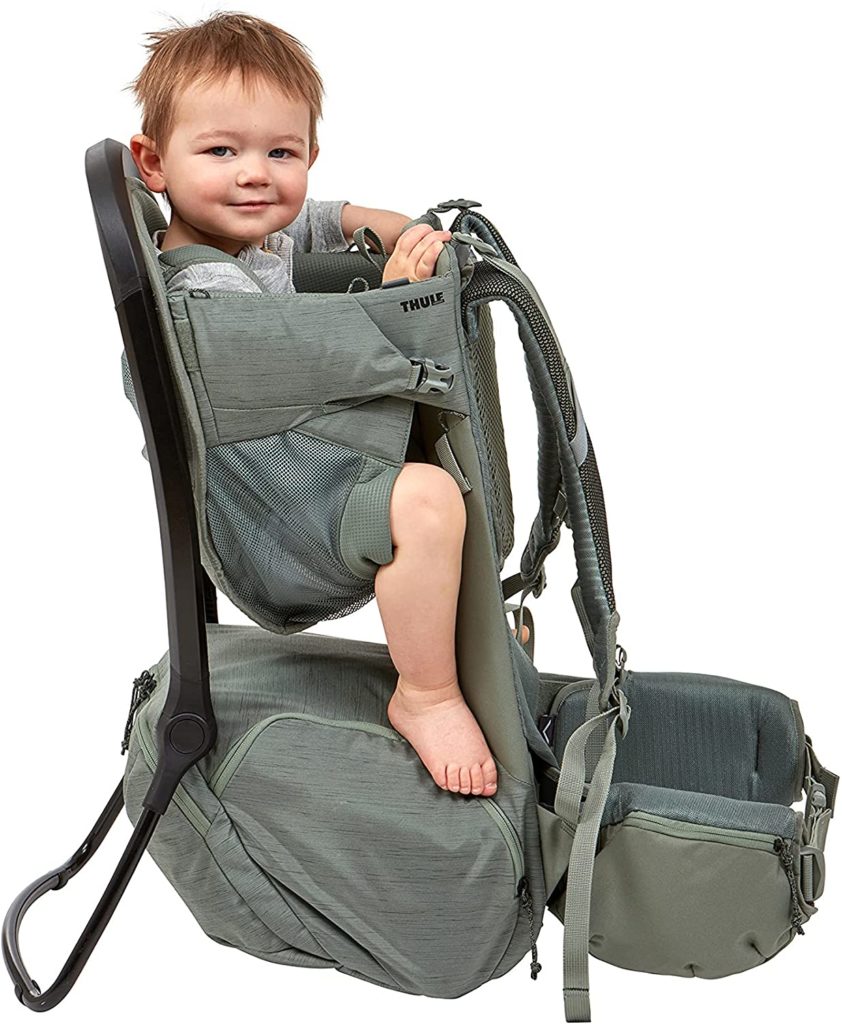

The Thule is a smartly constructed, very sturdy carrier — this thing is seriously built to last. You probably won’t need it, but all Thule products come with a limited lifetime warranty, just FYI. (Note: we are big fans of Thule’s outdoor gear — we really love their jogging strollers!)
Conclusion:
If you’re considering a hiking carrier, comfort is really what you want since you may be hauling a kid that weighs 30+ pounds over hill and dale. And although they all have adaptability features that work for different body sizes, it’s really important to remember that a carrier that works well for someone else may not be the best one for you.
I highly suggest trying on different baby hiking carriers before you buy to determine which work the best for you (head over to your local REI or L.L. Bean, both of which carry Deuter and Osprey). Worst case scenario, you can buy on Amazon and return it if it doesn’t work (check their policy first!).
Pro tip: if your carrier is bothering your hips or shoulders, try wearing it a little higher on your torso. Then try adjusting the shoulder straps and load-lifter straps (those near your shoulders) until you feel more comfortable. Don’t forget to check out this helpful guide from REI about how to properly fit a hiking carrier, and be sure to ask for help with fitting a carrier if you try one on at the store.
When you find the right hiking carrier for you, your back (and your kids) will appreciate it. Happy trails!!
Back to: Gear Guide
Related: